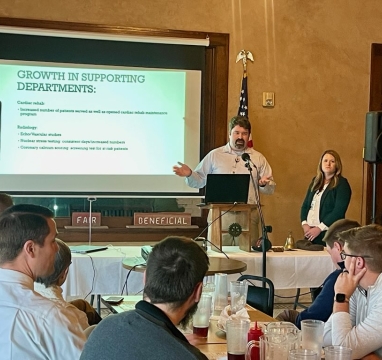Holdrege Rotarians learned about the Phelps Memorial Health Center Cardiology program from Pete Whitley, Cardiology Program Director, and Sadie Johnson, PA-C. The cardiology program is a collaborative program between Phelps Memorial Health Center and Pioneer Heart Institute, Lincoln.
Pete Whitely told Rotarians the goal of the program is to bring experienced cardiologists and innovative cardiology care to rural Nebraska. He said Sadie Johnson, PA-C is instrumental to the cardiology program and noted that four cardiologists from Pioneer Heart Institute see patients at the clinic including Dr. Douglas Netz, Dr. Denes Korpas, Dr. Steven Martin, and Dr. Hemantha Koduri.
Whitley said the first heart catheterization in the program was performed in January 2023 and since then they have completed:
- 126 heart cauterizations
- 34 vein ablations
- 10 loop recorder implants
- 9 pacemaker implants
- 6 peripheral angiograms
Sadie Johnson, PA-C, further explained procedures done in the cath lab at Phelps Memorial including the coronary calcium score which is a screening test for heart artery blockage.
Sadie said, “It’s a useful test for 40-75-year-olds with risk factors for artery blockage.” She added, “It’s a short CT scan that is approximately five minutes long and used to detect the amount of calcium in the vessels of the heart.”
She said “If you have risk factors, it’s a good test to know where you are at. It is $115 out of pocket because insurance does not cover it and it’s a great test to tell us the degree of calcium that is in the heart arteries. If numbers are elevated we will talk about medications that will lower the risk of heart attack, as well as consider stress test based on those numbers.”
The screening test can be referred by a medical provider.
Sadie also explained nuclear stress testing which is ordered if a patient has symptoms concerning heart artery blockage, abnormal findings on prior studies such as calcium score or EKG, or following up on prior heart blockage.
“For this test, a patient will either walk on a treadmill or be given a medication to stress the heart as a nuclear tracer is given through an IV to allow for imaging of the heart muscle to detect areas of the heart that may not be getting enough blood flow,” she said.
Another test done at Phelps Memorial is Heart Catheterization, which is a procedure where a small tube is inserted in either the wrist or groin artery to allow for smaller catheters/wires to run up through the tube up to the heart at which point dye is injected into the heart arteries.
“It’s the gold standard,” said Sadie. “We can see exactly how much blockage is in the arteries. If there is severe blockage we can put a stent in at Phelps Memorial.”
She explained that even if an intervention is done, almost all patients go home the same day.
Additional cardiology procedures/services offered at Phelps Memorial include:
- Renal angiogram
- Peripheral angiogram
- Transesophageal echocardiogram
- Cardioversion
- Loop recorder implantation
- Permanent Pacemaker or defibrillator
- Vein ablation
Pete said, “We’ve had a very successful first year and we are planning for growth. We plan to expand procedures, expand care to outreach communities, and increase clinic days throughout the week to meet the needs of our patients.”



